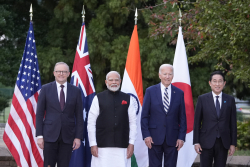Prime Minister Anthony Albanese has decided to skip the UN leaders’ summit, prompting questions about his absence and the reasons behind it. While some may argue that attending such events is important for global diplomacy and fostering relationships with other world leaders, others believe that busy leaders like Albanese have more pressing matters to attend to. A practical agenda is seen as a fine aim, but the details of such events may not always demand the scrutiny of leaders who have numerous responsibilities to juggle.
Albanese’s decision to skip the UN leaders’ summit raises questions about his priorities and focus as the Prime Minister. Some may view his absence as a missed opportunity to engage with other world leaders and address pressing global issues. However, others may argue that Albanese’s decision reflects his commitment to prioritizing domestic matters and addressing the needs of the Australian people. Busy leaders like Albanese may have to make tough decisions about where to allocate their time and resources, and attending international summits may not always be the top priority.
While attending global events like the UN leaders’ summit can be beneficial for networking and building relationships with other countries, it is important for leaders to strike a balance between international engagements and domestic responsibilities. For Albanese, focusing on issues at home may be seen as a more practical and effective use of his time as Prime Minister. By prioritizing domestic concerns, Albanese may be better able to address pressing issues facing Australia and make progress on key policy initiatives.
In conclusion, the decision by Prime Minister Anthony Albanese to skip the UN leaders’ summit raises questions about his priorities and focus as a leader. While attending such events can be important for global diplomacy, busy leaders like Albanese may have to prioritize domestic matters over international engagements. By focusing on issues at home, Albanese may be better equipped to address the needs of the Australian people and make progress on key policy initiatives. Ultimately, striking a balance between international commitments and domestic responsibilities is crucial for leaders like Albanese to effectively govern and serve their constituents.









